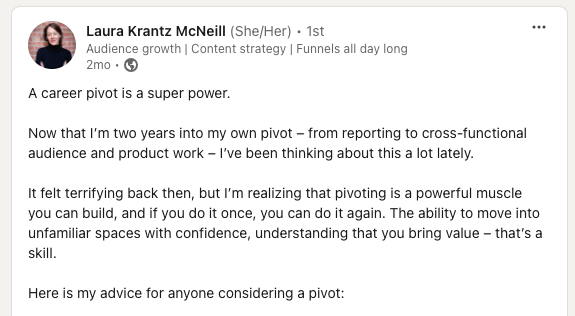'A career pivot is a super power'
Laura Krantz McNeill struck a nerve when she shared her advice on making a career pivot.
Her LinkedIn post ignited several discussions — hundreds of reactions, a dozen direct messages and eight separate Zoom calls later, she said it’s clear that many people are struggling to understand how to translate their skills to other jobs or industries.

A few major questions emerged from her conversations with people contemplating pivots, including:
- How can I talk about my skills? What am I good at outside the role I have right now?
- How do I get excited about a job outside my current vocation?
- What else is out there for me?
These uncertainties about how and where to turn involve a good deal of soul-searching. It was clear to her that we don’t talk enough about how to showcase our skills. As a product thinker, she uncovered a disconnect between the needs of the marketplace of professionals looking to make a switch and the way we’ve been trained to understand and discuss our value.
Thanks for reading Explore Your Career River! Subscribe for weekly inspiration.
Lost in translation
So many people become disillusioned by the relentless climb up the career ladder, you start to wonder why it exists in the first place.
When confronting a broken system, the first question to ask is: who does it serve? In the case of the career ladder, it’s those professionals with the interest and resources to devote to linear progress. I picture a Mad Men-era husband coming home to his wife and a freshly poured martini. That’s an extreme example, and of course there are many moments when the stars align and people from all walks of life have both the interest and capacity to level up in their careers. But it isn’t fair to expect all of us to be interested or able to professionally level up all the time.

The career ladder is a good idea that has gotten blown entirely out of proportion. It’s as though we took a moment in time — where a person can advance to a new level in a company — and stretched it to encompass the entirety of our working lives.
Who doesn’t the career ladder serve? Anyone without the interest and/or resources for linear professional progress. Think of caregivers, people experiencing life transitions, those affected by the opportunity gap. It could be people possessing a spirit of growth and exploration who are reluctant to confine themselves to just one definition of who they can be in the world. Any one of us could experience a season where continual professional progress is neither desirable nor feasible.

And there’s another side to this story. I’ve been talking about professional progress as though it’s entirely within the individual’s power, but of course we are all jockeying for position in the larger marketplace. The career ladder as a concept serves a system that treats professionals as replaceable cogs in a churning, money-making machine. Defining success exclusively in terms of job titles, salaries and external markers of achievement is easy, it’s replicable, and it requires little to no effort on the part of companies to understand and support the growth of unique individuals.

Encouraging exploration, on the other hand, introduces uncertainty. Will your employee grow so much they want to leave? How can you predict and plan for the future? How are you supposed to evaluate a resume containing skills from other industries?
There’s a moment from one of my favorite movies that I think about a lot. I’ve found the clip to show to my kids and used it as a screen grab in presentations. In A League of Their Own, Tom Hanks’ character is trying to convince his star player not to quit the team. With a steely glint in his eye, he leans in and lowers his voice, saying urgently:
“It's supposed to be hard. If it wasn't hard, everyone would do it. The hard is what makes it great.”
Thanks for reading Explore Your Career River! Subscribe for weekly inspiration.
Bottom line: A system that rewards easy, linear progress is built for the comfort of employers, not people.
A rich and rewarding professional journey will be great because it’s difficult – if we can find a way to follow our internal compass.
Krantz McNeill shone a light on this truth. She followed up offering advice on how to gain perspective before deciding where to turn. In the next edition, we’ll hear from an expert in pivots about his advice and his own shift from chasing success to pursuing fulfillment. His journey began on the 107th floor of the World Trade Center at 9:20 a.m. on Sept. 11, 2001.
Happy navigating,
Bridget
Explore Your Career River is taking a short summer break, and will return to your inbox mid-July.
Member discussion